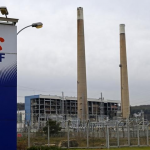India and France have past and ongoing commercial collaborations in petroleum and renewable energy, which can be expanded to green hydrogen and nuclear power. Both countries are large energy importers and have a shared interest in stable energy prices and decarbonisation. France is a leader in nuclear power and a pioneer in green hydrogen, technologies that India needs. India offers a large and growing market which can help bring down the cost of these technologies and mainstream them. This makes energy cooperation imperative and a key agenda point during President Emanuel Macron’s visit to India as the Chief Guest for its 75th Republic Day.
Gaz de France was one of the original shareholders in Petronet LNG, a company created to build natural gas import terminals in India. This stake was sold in mid 2010s. French energy major Total has invested over $3 billion in India through its ongoing partnership with Adani Group. These cover city gas distribution across 52 Indian cities, a renewable energy portfolio of 3.1 gigawatts (GW) and green hydrogen. Additionally, Total Energies is developing a major offshore gas field and associated LNG terminal in Mozambique – a mega-project worth over $24 billion. Indian government owned companies ONGC Videsh, Bharat PetroResources Limited (BPRL) and Oil India are partners in this project with a combined stake of 30%, making it the largest overseas energy investment by India.
Hydrogen is an important industrial gas used in steel making, petroleum refining and fertilizer. It can also be used to power vehicles, reducing the need for lithium, a mineral in short supply. At present, hydrogen is extracted from petroleum. Green hydrogen will be produced from water using green energy. France is a leader in this emerging technology and aims to produce 10 million tons of green hydrogen by 2030. It also has a network of hydrogen fuelling stations (for vehicles) and has hydrogen trains on order.
India has recently released a Green Hydrogen Roadmap, which seeks to deal with challenges such as technology, availability of materials, logistics and costs. The French experience with scaling up hydrogen ecosystem will be valuable for India.
India can start by mandating the use of green hydrogen for existing users (oil refineries and fertilizer plants) and for certain gated infrastructure such as airports, ports and warehouses. This will create a demand for green hydrogen, as well as equipment such as hydrogen powered vehicles, electrolysers, handling equipment etc. French companies can be invited to participate in one such cluster as group. This can help create a green hydrogen ecosystem in India, which can be scaled up.
In addition, India and France together with some of the larger corporates can jointly set up an innovation fund with a mandate to fund green hydrogen startups. Involving startups and entrepreneurs in the hydrogen ecosystem can help speed up innovation in the sector.
India currently gets just under 3% of its electricity from nuclear power. However, nuclear power presents the only viable alternative to replace coal – which provides almost 75% of India’s current electricity consumption. Renewable energy production is intermittent and cannot replace coal fired power. At present, India has 7.98 GW of operational nuclear power plants, with another 7.9 GW under construction and approvals for another 7 GW in place. These will not be sufficient to decarbonize India’s power generation.
France has been one of the largest users of nuclear power for decades and has one of the largest operational fleets of nuclear reactors worldwide. French company EDF (Éléctricité de France) has experience of building and operating nuclear power plants. EDF has an in-principle approval to build six nuclear power reactors adding up to 9.9 GW in Jaitapur, Maharashtra. This will be a largest single location nuclear power plant anywhere in the world.
This project was first proposed in 2010 and has been slow to progress. There have been concerns from local communities, on nuclear liability as well as questions over cost. In 2021, EDF submitted a binding Techno-Commercial offer for construction of the six reactors at Jaitapur. The first reactor of this design was commissioned in Finland in April 2023. All these steps mark progress for the project.
India too, in the recent years has improved its own track record of building and completing large infrastructure projects such as the just completed Mumbai Trans Harbour Link, multiple metro rail projects across various cities, and record speed in construction of national highways. This means that a new mega-project will be less likely to face delays as execution capabilities improve.
Finally, India and France are both large importers of natural gas and have an interest in a well-supplied global gas market. The fluctuations in gas prices over the past few years, due to geopolitical reasons, hurt both the economies. The past few years have seen a reluctance on part of global investors to finance new hydrocarbon (oil & gas) projects, which has worsened the impact of such disruptions. Developing new gas fields is technology and capital intensive – financial backers need to be certain that the project will find a market. India, with its growing energy needs (and therefore natural gas demand) can provide that assurance. India and France should seek out other opportunities, similar to Mozambique, to bring additional gas supplies into the world market.
Amit Bhandari is Senior Fellow for Energy, Investment and Connectivity, Gateway House.
This article was exclusively written for Gateway House: Indian Council on Global Relations. You can read more exclusive content here.
For permission to republish, please contact outreach@gatewayhouse.in.
Support our work here.
©Copyright 2024 Gateway House: Indian Council on Global Relations. All rights reserved. Any unauthorised copying or reproduction is strictly prohibited.


